下英语第六单元语法与练习
人教版2020-2021年七年级英语下册重点短语语法练习题:第六单元【含答案】

人教版2020-2021年七年级英语下册重点短语语法练习题第六单元第一部分【重点短语】watch TV 看报纸在电话上交谈听一张CD唱片使用电脑make soupwash the dishes what about you?kind of boring want to do sth.go to see the movies/go to the movies That sounds good.at home eat outI’d love to. drink teaswim in a pool 端午节live with sb. live in+地点any other night host familymiss his family wish(sb.)to do sth.there’s no place like home. study for a test【答案】看电视;read newspaper; talk on the phone; use the computer;熬汤;洗碗;你怎么样?;有点无聊;想做某事;去看电影;那听起来不错;在家;在外面吃;我愿意;喝茶;在游泳池里游泳;the Dragon Boat Festival; 跟……一起住;住在……;其他任一天晚上;寄宿家庭;思念他的家人;希望某人做某事;哪都不如自己家;为考试做准备第二部分【重点语法】I.现在进行时一、含义:用来表示现在正在进行或发生的动作;也可表示现阶段正在进行的动作。
句子中有时有now、look 、listen 暗示用现在进行时。
1、现在(说话的瞬间)正在进行或发生的动作,强调“此时此刻”I am speaking now.2、当前阶段正在进行的动作,强调“现阶段”。
E.g. She is reading a book these days.二、结构:am( be ) is + 动词ingareEg:1. I am listening to the music now.2. The students are drawing pictures now.3. Listen! She is riding a bike.三、时间标志词:现在进行时的时间状语有now, at present, at the moment, these days,等或当句子中含有look, listen开头的词时,也用现在进行时。
初中英语人教新目标七年级下册Unit 6 Section A预习指导(知识点+练习题)
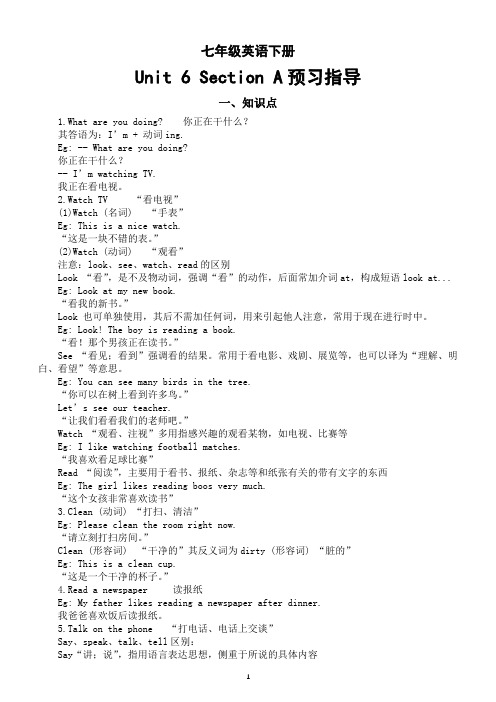
七年级英语下册Unit 6 Section A预习指导一、知识点1.What are you doing? 你正在干什么?其答语为:I’m + 动词ing.Eg: -- What are you doing?你正在干什么?-- I’m watching TV.我正在看电视。
2.Watch TV “看电视”(1)Watch (名词) “手表”Eg: This is a nice watch.“这是一块不错的表。
”(2)Watch (动词) “观看”注意:look、see、watch、read的区别Look “看”,是不及物动词,强调“看”的动作,后面常加介词at,构成短语look at...Eg: Look at my new book.“看我的新书。
”Look 也可单独使用,其后不需加任何词,用来引起他人注意,常用于现在进行时中。
Eg: Look! The boy is reading a book.“看!那个男孩正在读书。
”See “看见;看到”强调看的结果。
常用于看电影、戏剧、展览等,也可以译为“理解、明白、看望”等意思。
Eg: You can see many birds in the tree.“你可以在树上看到许多鸟。
”Let’s see our teacher.“让我们看看我们的老师吧。
”Watch “观看、注视”多用指感兴趣的观看某物,如电视、比赛等Eg: I like watching football matches.“我喜欢看足球比赛”Read “阅读”,主要用于看书、报纸、杂志等和纸张有关的带有文字的东西Eg: The girl likes reading boos very much.“这个女孩非常喜欢读书”3.Clean (动词) “打扫、清洁”Eg: Please clean the room right now.“请立刻打扫房间。
”Clean (形容词) “干净的”其反义词为dirty (形容词) “脏的”Eg: This is a clean cup.“这是一个干净的杯子。
2021年最新小学英语语法--6 非谓语动词基础知识与练习s
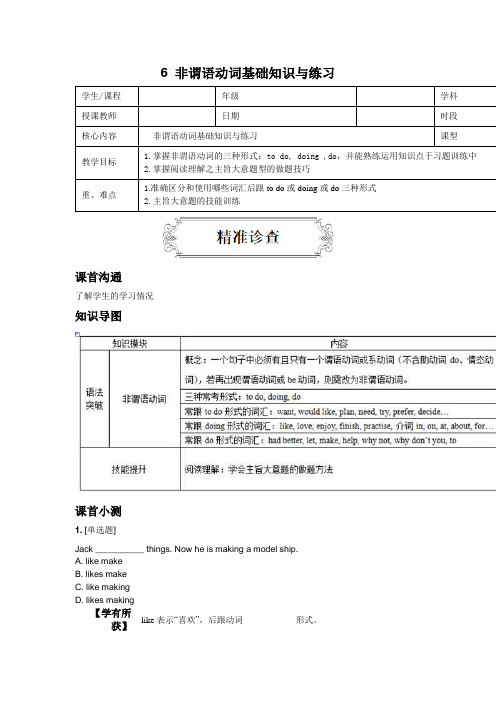
6 非谓语动词基础知识与练习课首沟通了解学生的学习情况知识导图课首小测1. [单选题]Jack __________ things. Now he is making a model ship.A. like makeB. likes makeC. like makingD. likes making【学有所like表示“喜欢”,后跟动词____________形式。
获】2. [单选题]There __________ on the plate.A. is breadsB. are breadsC. is some breadD. are some bread【学有所获】bread是不可数名词,there is+可数名词单数/不可数名词3. [单选题]__________ Children' s Day my mother goes to the Zoo with me.A. InB. AtC. OfD. On【学有所获】in后跟_________________________________________________________ on后跟_________________________________________________________ at后跟_________________________________________________________4. [单选题]---Would you like something to eat?---_____________________________A. Yes, I amB. Yes, I like it very muchC. Yes, pleaseD. Yes, I'd like some water【学有所获】Would you like some/something…?肯定回答:_____________________; 否定回答:____________________5. [单选题]Let him __________ what he likes.A. finishesB. finishingC. finishD. to finish【学有所获】let 后面跟动词________________________. 让某人做某事:___________________________6. [单选题]My parent will leave __________ Guangzhou at 9:00.A. withB. toC. forD. off【学有所获】固定搭配:出发,前往7. [单选题]Jack is an __________ boy.A. eleven years oldB. eleven-year-oldC. eleven-year oldD. eleven years-old【学有所获】11岁:_________________________; 11岁的:____________________________8. [单选题]Xiao Ming does well in __________ a kite.A. flyingB. flyC. fliesD. flys【学有所获】do well in=be good at 后面跟动词_____________形式9. [单选题]Can you __________ when the dance is over?A. drive meB. carry meC. pick me upD. pick up me【学有所获】开车接某人:____________________10. [单选题]__________ your parents at home last week?A. DidB. WasC. AreD. Were【学有所获】助动词开头的一般疑问句,会有_______________ 出现。
八年级下册英语第六单元语法知识点

八年级下册英语第六单元语法知识点
1、现在进行时:表示正在发生的事情或进行的动作,常与now, listen, look等词连用,结构是主语+be动词(am, is, are)+动词Ing.
2、一般现在时:表示经常反复发生的事情或动作,常与often, usually, sometimes, always, every day(week year…) on Sundays等词连用。
结构是主语+动词原形.当主语为第三人称单数即he, she, it, Tom, my mother, the boy等词时,动词后加s或es.
3、一般过去时:表示发生在过去的事情或存在的状态,常与just now. a moment ago. … ago. yesterday. last ( week. month. year. Monday. weekend). this morning等词连用。
结构是主语+be动词的过去式(was. were)或主语+动词的过去式。
注意:be动词与动词过去式不可同时使用。
4、一般将来时:表示将要打算发生的事情或动作,常与tomorrow, next week(year. Tuesday…), this
week( weekend .evening. afternoon.…)today等词连用。
结构是主语+be(am, is, are) going to + 动原或主语+will +动原。
5、情态动词:can. cant. should. should. must. may后一定加动词原形。
六年级下册英语书译林版笔记
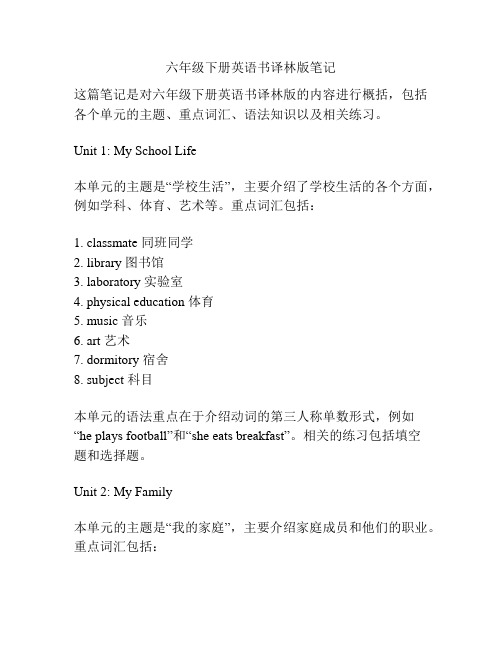
六年级下册英语书译林版笔记这篇笔记是对六年级下册英语书译林版的内容进行概括,包括各个单元的主题、重点词汇、语法知识以及相关练习。
Unit 1: My School Life本单元的主题是“学校生活”,主要介绍了学校生活的各个方面,例如学科、体育、艺术等。
重点词汇包括:1. classmate 同班同学2. library 图书馆3. laboratory 实验室4. physical education 体育5. music 音乐6. art 艺术7. dormitory 宿舍8. subject 科目本单元的语法重点在于介绍动词的第三人称单数形式,例如“he plays football”和“she eats breakfast”。
相关的练习包括填空题和选择题。
Unit 2: My Family本单元的主题是“我的家庭”,主要介绍家庭成员和他们的职业。
重点词汇包括:1. parents 父母2. father 父亲3. mother 母亲4. brother 兄弟5. sister 姐妹6. grandfather 爷爷7. grandmother 奶奶8. uncle 叔叔9. aunt 姑妈10. cousin 堂表兄弟姐妹11. doctor 医生12. teacher 老师13. police officer 警察本单元的语法重点是介绍形容词的比较级和最高级形式,例如“my brother is taller than me”和“my mother is the kindest person I know”。
练习包括填空题和选择题。
Unit 3: My Hobbies本单元的主题是“我的爱好”,主要介绍各种爱好及其相关的词汇。
重点词汇包括:1. hobby 爱好2. football 足球3. tennis 网球4. basketball 篮球5. swimming 游泳6. singing 唱歌7. dancing 跳舞8. drawing 画画9. reading 阅读10. writing 写作本单元的语法重点是介绍连词“and”和表述时间的方式,例如“Tom plays football and basketball”和“we usually go swimming on weekends”。
外研版八年级英语下册单元语法专练-Module6语法-句子的基本成分练习

Module 6 Hobbies.句子的基本成分练习(时间:100分钟,满分:100分)一、单项选择(本大题共50小题,每小题2分,共100分)1.The clothes ________ cotton ________ comfortable. I’ll take it.A.are made of; are felt B.made of; feelC.are made from; feel D.made from; are felt2.If my grandfather ________ available, he ________ there another time.A.isn’t; will get B.doesn’t; gets C.isn’t; gets D.doesn’t; will get 3.Which of the following has the same structure as “Mr Wang taught us Physics.”?A.He offered the boy a lot of advice.B.I saw him crossing the street yesterday. C.His face turned red quickly.D.We all laughed happily.4.Which of the following sentences has the same structure as “Lily gives me much help.”? A.Lily is 13 years old.B.Lily is a member of the Reading Club. C.Lily reads books every day.D.Lily’s Dad will buy her a new book. 5.—I find swimming ________. So I believe most of the students ________ it.—Great! That must make them healthy.A.enjoy, enjoyable B.enjoyable, enjoyable C.is enjoyable, enjoy 6.—You seem________,Jill.—Yes, my father bought a new bike for me.A.happy B.happily C.happiness7.Which of the following sentence has the same structure as “We think John a good student.’’?A.I found Betty difficult to work with.B.Amy bought a present for me last week. C.Singing brings the young man great happiness.D.Mum and Dad gave me nice presents for my birthday.8.The sentence structure of “They are swimming” is ________.A.S+V B.S+V+P C.S+V+O D.S+V+DO+OC 9.The structure of the sentence “Autumn leaves turn brown” is ________.A.S+V+DO+OC B.S+V+O C.S+V+P D.S+V 10.“Dustin found the Barbie doll broken.” What’s the structure of this sentence?A.S+V+DO+OC B.S+V+IO+DO C.S+V+DO+IO D.S+V+OC+DO11.All the volunteers thought her a good helper. The sentence type is ________.A.S+V+P B.S +V+DO+OC C.S+V+IO+DO D.S+V+DO 12.ORBIS doctors help patients see again. What is the structure of the sentence?A.S+V B.S+V+O C.S+V+IO+DO D.S+V+DO+OC 13.All the following sentences use the structure “S+V+P” EXCEPT ______.A.She likes flowers.B.He keeps fit.C.That music sounds great.D.Leaves turn brown.14.Your friend seems unhappy. Which sentence structure does the sentence belong to(属于)?A.S+V+IO+DO B.S+V+O C.S+V+P D.S+V 15.—How about going to Yongwang Shopping Mall on foot, dear?—If it ________ rainy now.A.won't B.isn't C.don't D.doesn't 16.Which has the same structure as "The reserve gives wildlife an ideal home."?A.The students are describing the birds.B.Birdwatching is interesting.C.The new film makes them happy.D.The hotel offers us free breakfast. 17.The sentence structure of “Farmers harvest crops.” is ________.A.S+V+IO+DO B.S+V+DO +OCC.S+V D.S+V+O18.— ___________?— There was a road accident.A.What was happened B.What’s happenedC.What’s happening D.What happened19.The sentence structure of “I saw some kids kicking the ball.” is _________.A.S+V+IO+DO B.S+V+O+OC C.S+V D.S+V+O 20.Lucy doesn’t pay for the juice, because it is free.A.宾语B.主语C.表语D.谓语21.The man is funny, so many students like to stay with him.A.主语B.状语C.表语D.宾语22.Did everyone have a good time?A.主语B.谓语C.宾语D.状语23.I can’t find my watch. It ______ in my pocket.A.maybe B.may C.may be24.The sentence structure of ‘We made her monitor.’ is________.A.S+V+ IO +DO B.S+V+O+OC C.S+V+P D.S+V+O 25.The sentence structure of “________” is “S+V”.A.The next bus will arrive.B.Some volunteers reached the village. C.The movie made the boy excited.D.Her voice is beautiful.26.Which of the following is the same as “I saw him reading a book.” in pattern(结构)? A.You have a very nice sister.B.The news made me happy.C.My grandpa gave me a red packet.D.He likes playing the piano. 27.Which sentence has the same structure as “I saw some kids kicking the ball in the park”? A.I always find English easy and useful.B.I am feeling much better than yesterday. C.I bought my father a scarf for his birthday.D.I saw a lot of foreigners the day before yesterday.28."Trees turn green in spring." Here, the sentence structure is the same as " ____________". A.Ken takes the train every day B.We are playing games in the park C.Nelly can speak a little Chinese.D.Lily and I are both pretty outgoing 29.—Where on earth are you now? The concert ______ 30 minutes ago.—Sorry. I am on my way. I ______ when you called me.A.has begun; was asleep B.has begun; was sleeping C.began; was asleep D.began; fell asleep30.Which of the following has the same sentence structure as "I know the man with glasses. "?A.We called the cat Mimi.B.The children are reading some stories. C.My mother told me to work hard.D.Molly is teaching the kids a new song. 31."David showed us his new watch just now." The underlined(画线) part is . A.OC B.DO C.P D.IO32.The sentence structure of “I saw him crossing the street.” is_______.A.S+V+O B.S+V+IO+DO C.S+V+DO+OC D.S+V+P 33.--Which one is right?--___________.A.It was snowy yesterday B.It snowed yesterdayC.There was snow yesterday D.All the above34."The children are playing in the park now." belongs to_____.A.S+V B.S+V+OC.S+V+P D.S+V+DO+OC35.Mum, I . I have a headache.A.am feeling well B.I’m wellC.must ill D.don’t feel well36.The sentence structure of “Teachers are excited.” is _________.A.S+V+DO B.S+V+IO+DO C.S+V+DO+OC D.S+V+P 37.The sentence(句子) “He gave me some nice presents” is ____________ .A.S+V+P B.S+V+DO+OC C.S+V+IO+DO D.S+V+O 38.Choose the correct structure(结构) of this sentence "He lent me a book."A.S+V+O B.S+V+IO+DOC.S+V+P D.S+V+DO+OC39.Which of the following is the same as “I saw him reading a book” in pattern(结构)? A.You have a very nice sister.B.He likes playing the piano. C.They are good at math.D.We call her Ms Liu.40.Which sentence structure belongs to "S+V+P"?A.Some of them cry.B.They are very tired.C.Teenagers have many problems.D.They find their English teacher funny.41.“The music sounds beautiful!” The structure of the sentence is:A.S+V+O B.S+V+P C.S+V+O+OC 42.“The food tastes delicious.” The structure of the sentence is:A.S+V+O B.S+V+P C.S+V+IO+DO 43.“Those sweet memories of summer days are about quiet streams and trees and shade.” The main structure of the sentence is .A.S+V B.S+V+DO+OC C.S+V+IO+DO D.S+V+P 44.What kind of structure is the sentence “The girl showed Millie some photos.” ?A.S+V+O B.S+V+PC.S+V+IO+DO D.S+V+DO+OC45.The shop _____ at 8:00 a.m. and it ________ for ten hours every day.A.opens; is open B.is opened; opensC.is open; has opened D.opened; opens46.I made the baby stop crying. The sentence structure is ________.A.S+V B.S+V+OC.S+V+IO+DO D.S+V+DO+OC47.The sentence structure of “Teachers ask me to finish the homework on time.” is _______. A.S+V+DO B.S+V+IO+DO C.S+V+DO+OC D.S+V+P 48.Tom’s uncle knows computers well, and he __________ a computer engineer . A.maybe B.may be C.may be is D.may is 49.We found our English teacher very interesting. Its structure is________ .A.S+V+P B.S+V+DO+OC C.S+V+IO+DO D.S+V+DO 50.What’s the sentence structure of “ Spring is warm and sunny.”?A.S+V B.S+V+P C.S+V+O D.S+V+DO+OC参考答案:1.B【解析】句意:棉布做的衣服摸起来很舒服。
小学英语语法名词练习题及答案
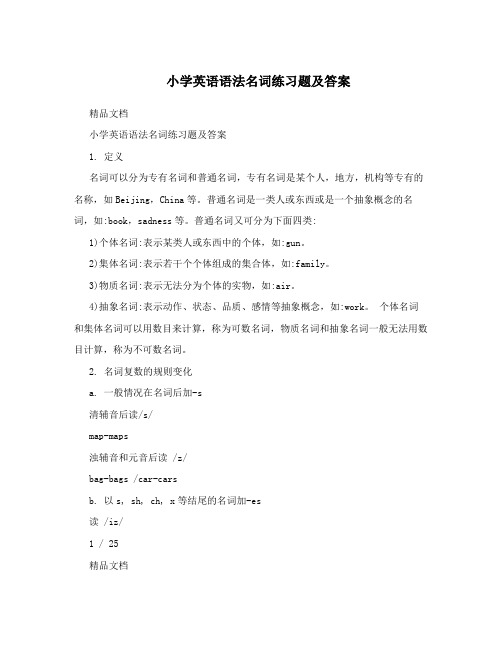
小学英语语法名词练习题及答案精品文档小学英语语法名词练习题及答案1. 定义名词可以分为专有名词和普通名词,专有名词是某个人,地方,机构等专有的名称,如Beijing,China等。
普通名词是一类人或东西或是一个抽象概念的名词,如:book,sadness等。
普通名词又可分为下面四类:1)个体名词:表示某类人或东西中的个体,如:gun。
2)集体名词:表示若干个个体组成的集合体,如:family。
3)物质名词:表示无法分为个体的实物,如:air。
4)抽象名词:表示动作、状态、品质、感情等抽象概念,如:work。
个体名词和集体名词可以用数目来计算,称为可数名词,物质名词和抽象名词一般无法用数目计算,称为不可数名词。
2. 名词复数的规则变化a. 一般情况在名词后加-s清辅音后读/s/map-maps浊辅音和元音后读 /z/bag-bags /car-carsb. 以s, sh, ch, x等结尾的名词加-es读 /iz/1 / 25精品文档bus-buses/watch-watches/brush-brushes/box-boxesc. 以ce, se, ze,等结尾加 -s读 /iz/license-licensesd. 以辅音字母+y结尾的名词把变y 为i再加es读 /z/baby---babiese. 以o 结尾的名词,变复数时:1). 加s,如: photo---photos piano---pianosradio---radioszoo---zoos;2). 加es,如:potato--potatoes tomato--tomatoes3). 上述a和b两种方法均可,如zero---zeros / zeroes。
f. 以f或fe 结尾的名词变复数时:1). 加s,如: belief---beliefsroof---roofssafe---safes gulf---gulfs2). 去f, fe 加ves,如:half---halvesknife---knives leaf---leaves wolf---wolveswife---wives life---lives thief---thieves3). 上述a和b两种方法均可,如handkerchief:2 / 25精品文档handkerchiefs / handkerchieves。
六语第六单元日积月累课堂笔记
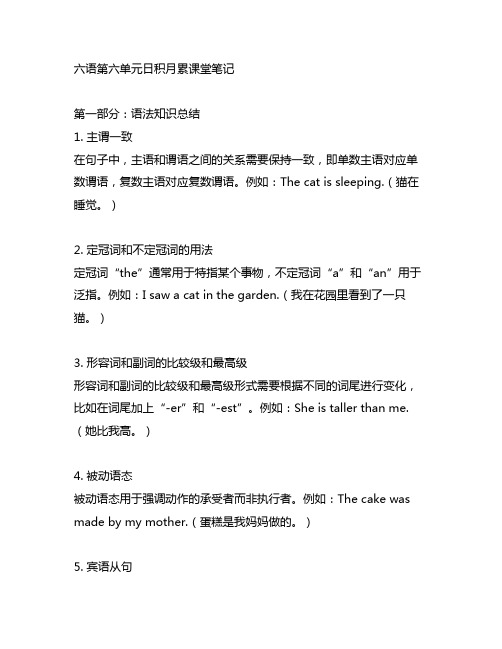
六语第六单元日积月累课堂笔记第一部分:语法知识总结1. 主谓一致在句子中,主语和谓语之间的关系需要保持一致,即单数主语对应单数谓语,复数主语对应复数谓语。
例如:The cat is sleeping.(猫在睡觉。
)2. 定冠词和不定冠词的用法定冠词“the”通常用于特指某个事物,不定冠词“a”和“an”用于泛指。
例如:I saw a cat in the garden.(我在花园里看到了一只猫。
)3. 形容词和副词的比较级和最高级形容词和副词的比较级和最高级形式需要根据不同的词尾进行变化,比如在词尾加上“-er”和“-est”。
例如:She is taller than me.(她比我高。
)4. 被动语态被动语态用于强调动作的承受者而非执行者。
例如:The cake was made by my mother.(蛋糕是我妈妈做的。
)5. 宾语从句宾语从句用于作为动词的宾语,通常由连接词引导,如“that”或者“who”。
例如:I know that he is a good student.(我知道他是一个好学生。
)第二部分:词汇积累1. 常用动词在日常生活中,经常使用的动词包括“eat”(吃)、“drink”(喝)、“walk”(走)、“run”(跑)等。
2. 常用名词常见的名词有“house”(房子)、“car”(汽车)、“book”(书籍)、“teacher”(老师)等。
3. 常见形容词常用的形容词包括“big”(大)、“small”(小)、“beautiful”(美丽)、“tall”(高)等。
4. 常用副词常见的副词有“quickly”(快速地)、“slowly”(慢慢地)、“carefully”(小心地)、“happily”(快乐地)等。
第三部分:语言实践1. 口语练习通过模拟对话的方式进行口语练习,例如在购物、问路、点餐等场景中进行练习,以提高日常交流能力。
2. 阅读练习阅读英文故事、报纸、杂志等,提高阅读理解能力,积累词汇和语法知识。
- 1、下载文档前请自行甄别文档内容的完整性,平台不提供额外的编辑、内容补充、找答案等附加服务。
- 2、"仅部分预览"的文档,不可在线预览部分如存在完整性等问题,可反馈申请退款(可完整预览的文档不适用该条件!)。
- 3、如文档侵犯您的权益,请联系客服反馈,我们会尽快为您处理(人工客服工作时间:9:00-18:30)。
Unit 6 I’m watching TV一、词汇拓展1. use(现在分词)using2. wash(现在分词)washing3. drink(现在分词)drinking4. shop (现在分词)shopping5. man(复数) men6. Study(现在分词)studying7. America(形容词)American 8. dragon(复数)dragons 9. child(复数)children10.young(反义词)old 11. miss(现在分词)missing 12. wish(同义词)hope二、关键句型1. What are you doing 你在做什么I’m watching TV. 我在看电视。
2. What’s she doing 她在做什么She’s washing her clothes. 她在洗她的衣服.3. What are they doing 他们在做什么They’re listening to a CD. 他听一CD 唱片。
4. Are you doing your homework 你在做你的家庭作业吗Yes, I am. / No, I’m not. I’m cleaning my room.是的,我在做。
/ 不,我没有。
我在打扫我的房间。
5. Zhu Hui misses his family and wishes to have his mom’s delicious zongzi.朱辉思念他的家人并希望吃上他妈妈的可口粽子。
三、重点补充1. 现在进行时的结构:肯定:主语+be+Ving. (be动词和动词+ing两者缺一不可)否定:主语+be not+Ving. 疑问:Be+主语 + Ving动词现在分词的变化见下表:1)一般情况加—ingplay玩—playing do做—doing go去—going jump跳—jumpingsing唱—singing ski滑雪—skiing see看见--seeing2)以不发音的e结尾去e加—ingmake做—making take拿到—taking like喜欢—liking come来—comingwrite写—writing dance跳舞—dancing have有—having close关—closing 3)以重读闭音节结尾的动词,中间只有一个元音字母,词尾只有一个辅音字母双写最后一个辅音字母再加—ing.swim游泳—swimming sit坐—sitting run跑—running get得到—getting put放—putting begin开始—beginning jog慢跑—joggingbabysitting cutting beginning planning shopping stopping skipping swimming digging kidding;4)变ie为y再加ing的有lie---lying tie---tying die---dying考题形式:(1) 已知be动词,考后面的动词形式(要加ing);(2) 已知后面的动词+ing, 则前面用be动词。
如:(1) The boy is _________ (run) with his father.(2) Some children are __________ (lie) on the grass.(3) My brother and I are __________ (play) soccer.(4) His sister is __________ (read) a book.2. --你正在做什么-- What are you doing --我正在看电视。
-- I’m watching T V.3. 那听起来很棒:That sounds great/good.4. 谢谢你的信和照片:Thanks for your letter and the photos.① 谢谢某东西:Thanks for sth ② 句型:谢谢做某事:Thanks for doing sth5. 这是我的一些照片:Here are some of my photos. (“一些照片”是“复数”,be用are)这是我的一张全家福照:Here is a photo of my family. (“一张照片”是“单数”,be用is)注意:be的形式与后面名词在数保持一致。
3.忙于做某事:be busy doing sth. His brother is busy _________ (write) stories in his room.7. 表示“活动”的“动词词组”① 做家庭作业:do one’s homework ② 打扫房间:clean the room③ 吃晚饭:eat dinner ④ 打电话:talk on the phone = make a telephone call⑤ 看书/看报/看杂志:read books, read newspapers, read magazines⑥ (学生)上课:have an English class (老师)上课:give an English class⑦ 举行晚会:have an evening party ⑧ 和某人说再见:say goodbye to sb8. 在购物中心:at the mall 在游泳池:at the (swimming) pool在学校:at school 在体育馆里:in the gym9. 在第一张照片中:in the first photo 在第二张照片中:in the second photo在下一张照片中:in the next photo 在最后一张照片中:in the last photo10. 等汽车:wait for the bus 在汽车站等(某人):wait (for sb) at the bus stop11. 我的兄弟和我:my brother and I (要把“我”放在后面)12. (身体)好,健康:well = fine 如:-- How is your mother -- She is _______.13. 活动:activity 复数:activities (以辅音字母+y结尾的,去y加ies)玩具:toy 复数:toys (以元音字母+y结尾的,直接加s)day boy 14. (1) 也:also 用于“肯定句的句中”;(2) 也:too 用于“肯定句的句末,前加逗号”;(3) 也:either 用于“否定句的句末,前加逗号”。
15. (1) show n. 节目;如:TV show, sports show, game show, talk show(2) show v. 给…看;如:Can you show me your family photo I’ll show you the way.(3) show v. 表演;如:Can you show us Beijing Opear五、佳作欣赏What are they doingIt’s seven o’clock in the evening. Kate’s family are all at home. Kate is doing her homework. Her father is reading a book. Her mother is watching TV. Her grandfather is listening to the radio and her grandmother is cleaning the room. Her sister, Betty, is playing computer games.单项选择。
(30分)( )1. What is Kate doing __________A. She is in the room.B. Yes, she isC. She is readingD. She is run( )! What is Tom doing He’s _______ TV.at( ) are they playing football( ) 4. A: Is he writing or reading B: ________.A. Yes, he isB. No, he isn’tC. He’s readingD. Yes, he is writing.( )5. The men ________ to the radio.A. are listeningB. listeningC. is listeningD. are listenning ( 6. Thanks for_______me.A. helpsB. is helpingC. helpingD. help( )7. We are doing ______.A. our homeworkB. our homeworksC. her homeworkD. his homework ( )8. Here ______ a photo of my family. You can see me in it.A. areB. isC. amD. be( ) the first photo, I ______ at the mall.A. On; shopB. On; shoppingC. In; am shopingD. In; am shopping( )10. Do you want ______ to the movies with us this eveningA. goB. to goC. goesD. going( )11. Look,Nancy _______ a letter to her parents.A. writingB. is writingC. is writeingD. writes ( )12. Listen! Who_________ ---Emma is.A. singingB. is singingC. singD. are singing( )13. —Where is Mike —He’s _______ the pool.A. swim atB. swimming atC. swiming atD. swims ( )’s six o’clock. The Green family _______ dinner.A. is eatingB. are eattingC. are eatingD. eats ( )15. Jimmy likes _______ soccer. Look! He is _________ soccer.A. playing; playingB. play; playC. plays; playsD. playing; plays( )16. That sounds very _______.A. niceB. goodC. wellD. both A and B( ) is a photo _______ my family.A. ofB. onC. inD. ’s( )18. Who _______my parents talking _______A. are; /B. is; /C. are; toD. is; at( )19. Kate has many _______,and she likes _______ very much.A. pictures; themB. picture; themC. pictures; itD. picture; it( )20. Thank you for _________ me a letter.A. writeB. to writeC. is writingD. writing( )2 1. Please be quiet, my grandfather___________ .A sleepB sleepsC is sleepingD are sleeping( ) 22. In__________ photo, a boy is playing soccer.A twoB secondC the twoD the second( )2 3. Look! Mary and her brother ___________ there.A are talking overB is talking overC are talking toD are talking about( ) 24. I_________ my room every day. But now I __________. .A clean, am readingB am cleaning, readingC cleaning, readD clean, read( ) 25. In the picture you can see a boy swimming. His father ___________ him.A seesB is lookingC is look atD is watching( ) 26. It’s 7o’clock. Tom___________ dinner at home.A is havingB haveC hasD having( ) 27. We __ any Chinese classes on Thursdays. And we __an English class now.A aren’t having, are havingB don’t have , haveC don’t have, are havingD aren’t having, don’t have( ) 28. ----Let’s go to the park, Lily.----- ____ Shall we go nowA Sorry, I can’tB SureC It’s boringD Thanks( ) 29. -----Ling Ming, are you listening or writing ----- .A Yes, I amB I’m listeningC No, I am not writingD I’m listening and writing( ) 30. -----What are you doing ----- _________. It is too dirty.A I’m doing my homeworkB I’m playing computer gamesC I’m cleaning the roomD I’m writing二、完型填空。
